Business
Sri Lanka’s macroeconomic policy setting: Cohesion or confusion?
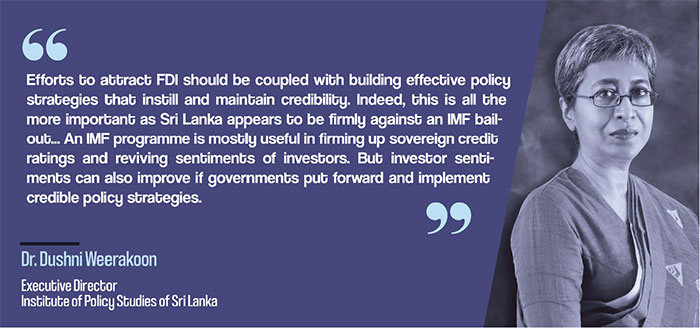
By Dushni Weerakoon
The hike in policy interest rates by the Central Bank of Sri Lanka (CBSL) in August 2021 marks a shift from stimulus to exit strategies in the pandemic era. Such recalibrations globally are focused on how to tackle the historically large debt-to-GDP ratios that the COVID-19 pandemic leaves in its wake. At end 2020, advanced economies (AEs) on average had amassed debt to the tune of 120% of their GDP with emerging markets economies (EMEs) trailing some distance at 65% of GDP. As the spotlight moves, the full impacts of the macroeconomic policy measures, hitherto obscured by the urgency to deal with the health crisis, are now coming under greater scrutiny.
Sri Lanka’s debt metrics make an orderly exit more difficult
Many countries, especially AEs, exercised their ‘monetary sovereignty’ to create and print their own money to support stimulus efforts. They have done so through coordinated monetary/fiscal policies – i.e. using monetary policy to keeping borrowing costs low while fiscal authorities provide back-stop assurance. Some are better positioned to manage the inherent risks and conflicts of interest that are involved in this exercise. AEs have an advantage as issuers of reserve currencies with global demand and historically low interest rates; EMEs with limited exposure to foreign currency-denominated debt and holding comfortable stockpiles of reserves are less exposed to disruptive tail events.
Such countries can bring down their debt ratios if they are able to maintain nominal GDP growth persistently above the average interest rates that they pay on their debt – i.e. the growth-corrected interest rate (r-g) whereby countries can run modest primary deficits and still have a stable or falling debt-to-GDP ratio.
Sri Lanka is not similarly positioned. Its debt metrics point to high vulnerabilities – a high debt-to-GDP ratio of 101% of GDP, large exposure to foreign currency-denominated debt, and a hefty foreign debt repayment schedule. Under these conditions, the threat from exercising monetary sovereignty was always self-evident. A depreciating currency, notwithstanding distortionary controls on imports and capital flows, worsens the debt vulnerabilities.
Domestic and foreign debts are hardly similar. Given Sri Lanka’s debt metrics and the fundamental economic imbalances that have generated them, simple accounting identities do not always offer very plausible solutions. If the exchange rate depreciates, it adds to the real value of outstanding debt, relative to the size of the economy, even if interest rates remain modest. Further, shocks like COVID-19 raise risk premia, and marginal borrowing costs can rise suddenly and sharply, cutting countries abruptly out of financial markets.
Crucial to instill and retain macroeconomic policy credibility
 Short of distortionary measures such as inflating debt away or maintaining an overvalued currency, a primary surplus is needed to stop the public debt-to-GDP ratio from rising and an even larger surplus is needed to reduce it. Improving the primary budget balance calls for tax increases or public spending cuts that are unpopular and have upfront costs. Given the government’s unwillingness to go down this path, households and firms will be required instead to bear the cost through higher interest rates that will affect their consumption and investments.
Short of distortionary measures such as inflating debt away or maintaining an overvalued currency, a primary surplus is needed to stop the public debt-to-GDP ratio from rising and an even larger surplus is needed to reduce it. Improving the primary budget balance calls for tax increases or public spending cuts that are unpopular and have upfront costs. Given the government’s unwillingness to go down this path, households and firms will be required instead to bear the cost through higher interest rates that will affect their consumption and investments.
Higher interest rates in this instance will also not ‘pull in’ foreign capital to firm up the exchange rate given the risk premia on the currency front as depreciating pressure deepens. With reserves in hand to cover barely two months of imports, the forex market will continue to face volatility and instability until a steady stream of capital inflows, beyond short-term swaps, emerge. Until such time, a depreciating domestic currency will increase the interest burden as calculated in that currency. If debt servicing interest rate costs are pushed persistently above the economic growth rate, Sri Lanka’s debt burden will grow steadily even in the absence of new borrowing – a context sometimes called a ‘debt spiral’.
Without a clearly spelt-out debt sustainability path, Sri Lanka seems to be placing all its bets on foreign direct investment (FDI) to ease external pressures and revive economic growth. For a successful outcome – i.e. productivity gains to drive long-term growth – the type of FDI matters. The more desirable is efficiency-seeking FDI, but this is also harder to attract. For now, a policy environment of import curbs and capital controls is more likely to see strategic-seeking infrastructure-led FDI. The latter runs the risk of switching resources to non-tradable sectors – reducing the availability of external financing over the longer term – and the prospect of a short-lived growth burst as before in the post-war years. Crucially too, the sole reliance on FDI leaves Sri Lanka at the mercy of developments beyond its control.
Rather, efforts to attract FDI should be coupled with building effective policy strategies that instill and maintain credibility. Indeed, this is all the more important as Sri Lanka appears to be firmly against an International Monetary Fund (IMF) bailout. IMF loan amounts are small and it no longer has much sway on debt relief with much of EME foreign debt held by private institutional investors and China. An IMF programme is mostly useful in firming up sovereign credit ratings and reviving the sentiments of investors. But investor sentiments can also improve if governments put forward and implement credible policy strategies. By contrast, the CBSL’s policy rate adjustment to anchor expectations, for instance, will not stick if direct financing of fiscal spending is to continue under yield control measures. Instead, market convictions on the credibility of the policy mix will drive economic fundamentals. As Sri Lanka readies to transition out of pandemic-related emergency support, some notion of fiscal and debt sustainability to anchor confidence should be the priority in Budget 2022 preparations.
* This blog is based on the comprehensive chapter on “Economic Performance and Outlook: Managing the Crisis and Promoting Recovery” in IPS’ forthcoming annual flagship publication ‘Sri Lanka: The State of Economy 2021’
.
Link to blog: https://www.ips.lk/talkingeconomics/2021/08/30/sri-lankas-macroeconomic-policy-setting-cohesion-or-confusion/
Dushni Weerakoon is the Executive Director of the Institute of Policy Studies of Sri Lanka (IPS) and Head of its Macroeconomic Policy research. She joined IPS in 1994 after obtaining her PhD, and has written and published widely on macroeconomic policy, regional trade integration and international economics. She has extensive experience working in policy development committees and official delegations of the Government of Sri Lanka. Dushni Weerakoon holds a BSc in Economics with First Class Honours from the Queen’s University of Belfast, U.K., and an MA and PhD in Economics from the University of Manchester, U.K.
Business
IMF staff team concludes visit to Sri Lanka
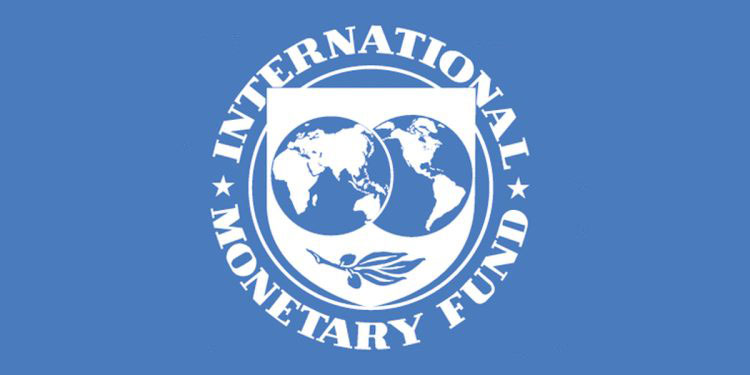
An International Monetary Fund (IMF) team led by Evan Papageorgiou visited Colombo from April 3 to 11, 2025. After constructive discussions in Colombo, Mr. Papageorgiou issued the following statement:
“Sri Lanka’s ambitious reform agenda supported by the IMF Extended Fund Facility (EFF) continues to deliver commendable outcomes. The post-crisis growth rebound of 5 percent in 2024 is impressive. Inflation declined considerably in recent quarters and has fallen to ‑2.6 percent at end-March 2025. Gross official reserves increased to US$6.5 billion at end-March 2025 with sizeable foreign exchange purchases by the central bank. Substantial fiscal reforms have strengthened public finances.
“The recent external shock and evolving developments are creating uncertainty for the Sri Lankan economy, which is still recovering from its own economic crisis. More time is needed to assess the impact of the global shock and how its implications for Sri Lanka can be addressed within the contours of its IMF-supported program.
“The government’s sustained commitment to program objectives is ensuring policy continuity and program implementation remains strong. Going forward, sustaining the reform momentum is critical to safeguard the hard-won gains of the program and put the economy on a path toward lasting macroeconomic stability and higher inclusive growth.
“Against increased global uncertainty, sustained revenue mobilization efforts and prudent budget execution in line with Budget 2025 are critical to preserve the limited fiscal space. Boosting tax compliance, including by reinstating an efficient and timely VAT refund mechanism, will help contribute to revenue gains without resorting to additional tax policy measures. Avoiding new tax exemptions will help reduce fiscal revenue leakages, corruption risks and build much needed fiscal buffers, including for social spending to support Sri Lanka’s most vulnerable. Restoring cost recovery in electricity pricing will help minimize fiscal risks arising from the electricity state-owned enterprise.
“The government has an important responsibility to protect the poor and vulnerable at this uncertain time. It is important to redouble efforts to improve targeting, adequacy, and coverage of social safety nets. Fiscal support needs to be well-targeted, time-bound, and within the existing budget envelope.
“While inflation remains low, continued monitoring is warranted to ensure sustained price stability and support macroeconomic stability. Against ongoing global uncertainty, it remains important to continue rebuilding external buffers through reserves accumulation.
“Discussions are ongoing, and the authorities are encouraged to continue to make progress on restoring cost-recovery electricity pricing, strengthening the tax exemptions framework, and other important structural reforms.
“The IMF team held meetings with His Excellency President and Finance Minister Anura Kumara Dissanayake, Honorable Prime Minister Dr. Harini Amarasuriya ; Honorable Labor Minister and Deputy Minister of Economic Development Prof. Anil Jayantha Fernando, Honorable Deputy Minister of Finance and Planning Dr. Harshana Suriyapperuma, Central Bank of Sri Lanka Governor Dr. P. Nandalal Weerasinghe, Secretary to the Treasury Mr. K M Mahinda Siriwardana, Senior Economic Advisor to the President Duminda Hulangamuwa, and other senior government and CBSL officials. The team also met with parliamentarians, representatives from the private sector, civil society organizations, and development partners.
“We would like to thank the authorities for the excellent collaboration during the mission. Discussions are continuing with the goal of reaching staff-level agreement in the near term to pave the way for the timely completion of the fourth review. We reaffirm our commitment to support Sri Lanka at this uncertain time.”
Business
ComBank unveils new Corporate Branch at Head Office
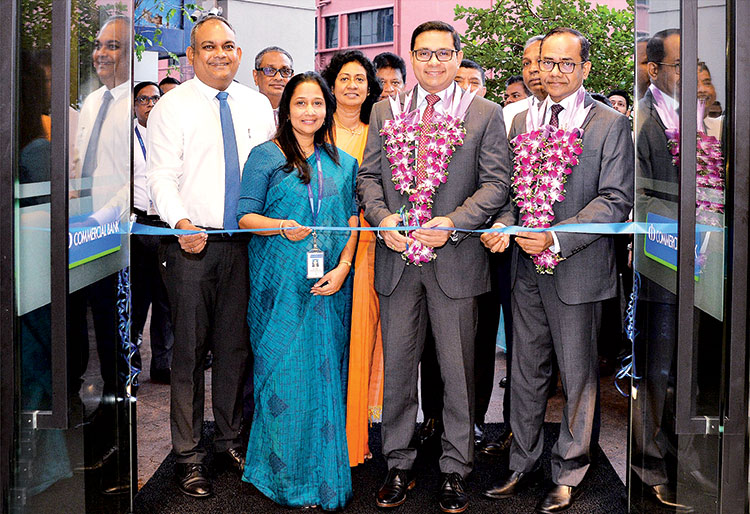
The Commercial Bank of Ceylon has transformed its iconic ‘Foreign Branch’ into the ‘Corporate Branch,’ reaffirming its commitment to delivering dedicated, comprehensive financial solutions to corporate and trade customers.
The Bank said this transformation represents a new milestone in its illustrious journey, and resonates with the rich commercial heritage of Colombo, a city that has long served as a vital trading hub in the region.
Strategically located at the Bank’s Head Office at Commercial House, 21, Sir Razeek Fareed Mawatha (Bristol Street), Colombo 1, this rebranded Corporate Branch stands as a first of its kind in Sri Lanka —a premier financial hub tailored exclusively to the needs of corporate customers, the Bank said. The transformation aligns with the Bank’s vision of providing unparalleled service excellence, bespoke financial solutions, and fostering long-term business partnerships.
Commenting on this strategic initiative, Commercial Bank’s Managing Director/CEO Sanath Manatunge stated: “It is our aspiration that just as the historic Delft Gateway, at which our Head Office is located, once opened the path to the Dutch Fort, our Corporate Branch will chart a new era of enduring and prosperous business collaborations, that will extend beyond Sri Lanka’s shores.”
Business
Fits Retail and Abans PLC Unveil Exclusive DeLonghi Premium Coffee Experience
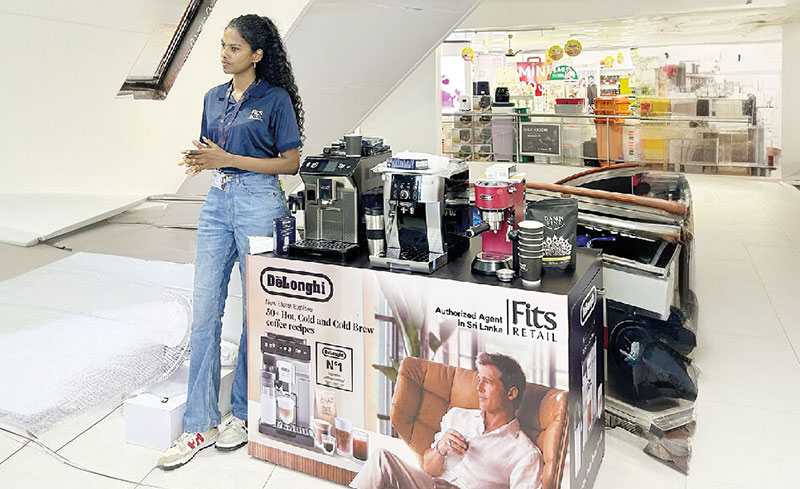
Fits Retail has partnered with retail giant Abans PLC to showcase the iconic DeLonghi coffee machines at two of Colombo’s most prestigious locations: Abans Elite Colombo 3 and Abans Havelock City Mall showrooms.
At these dedicated demonstration zones, visitors can discover the unparalleled precision engineering and user-friendly technology that have made DeLonghi machines the preferred choice for discerning coffee lovers in more than 46 countries worldwide. Renowned for consistently delivering café-quality espresso, cappuccino, and even specialty cold brews, DeLonghi machines exemplify Italian innovation at its finest.
Yasas Kodituwakku, CEO of Fits Retail, expressed excitement about the collaboration: “This partnership represents our unwavering commitment to bringing global coffee excellence to Sri Lankan connoisseurs. With Abans PLC, we’re creating more than just demonstration spaces; we’re curating premium destinations for an authentic coffee experience.”
“As pioneers of premium lifestyle experiences in Sri Lanka, our collaboration with Fits Retail aligns seamlessly with our vision of elevating everyday moments into exceptional experiences,” said Tanaz Pestonjee, Director Business Development at Abans PLC.
-

 News5 days ago
News5 days agoSuspect injured in police shooting hospitalised
-

 Features6 days ago
Features6 days agoRobbers and Wreckers
-
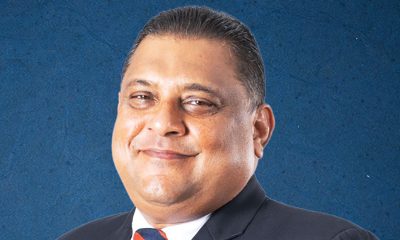
 Business6 days ago
Business6 days agoBhathiya Bulumulla – The Man I Knew
-

 Business5 days ago
Business5 days agoSanjiv Hulugalle appointed CEO and General Manager of Cinnamon Life at City of Dreams Sri Lanka
-

 Business7 days ago
Business7 days agoNational Anti-Corruption Action Plan launched with focus on economic recovery
-

 Features4 days ago
Features4 days agoLiberation Day tariffs chaos could cause permanent damage to US economy, amid global tensions
-
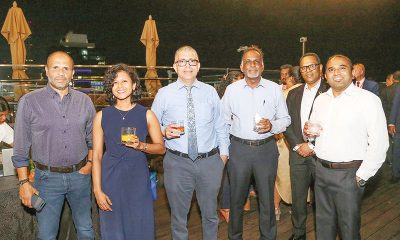
 Business4 days ago
Business4 days agoMembers’ Night of the Sri Lanka – Russia Business Council of The Ceylon Chamber of Commerce
-
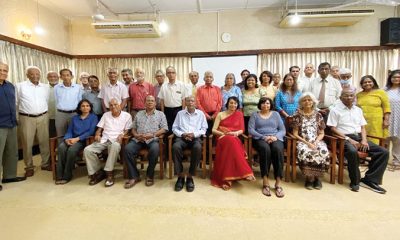
 Features4 days ago
Features4 days agoMinds and Memories picturing 65 years of Sri Lankan Politics and Society











